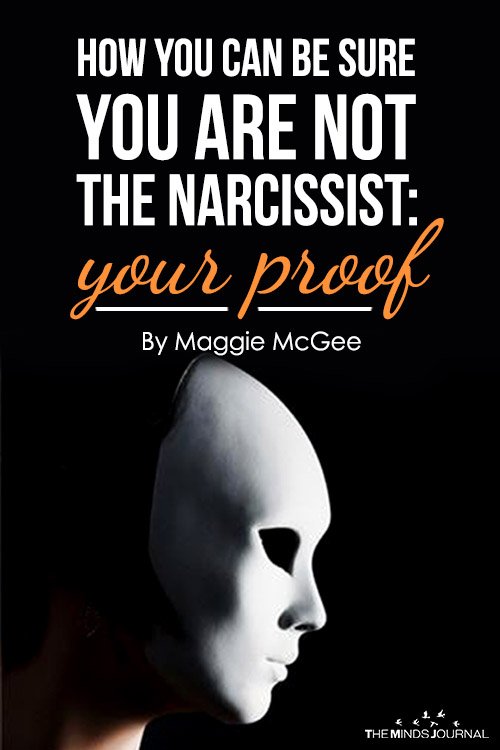‘How do I know I’m not the narcissist???’ I can’t tell you how many times I’ve heard this frantic question. But let me tell you how you know you are not the narcissist.
Asking yourself this is a testament to the fact that the narcissist is inside your head, and the abuse is working.
It’s also clear evidence that you are simply not a narcissist.
Reading these few words isn’t going to convince you though, right?
I’m guessing that for you to be asking yourself this, your journey of recovery has progressed to the point where you’ve done a heap of reading on Narcissistic Personality Disorder (NPD).
You’re at the stage where you have a solid handle on the disorder, its symptoms, and the manipulation strategies used by abusive narcissists.
This must be the case or you wouldn’t be worried that you are narcissistic, as the phenomenon and associated behavior wouldn’t mean all that much to you right now.
With all the information you’ve gathered, and more importantly because of the narcissist’s brainwashing about who and what you are, the question niggles at you…you are scanning yourself, your behaviours, things you’ve done and haven’t done that could be classified as narcissistic…and here you are slap bang in the middle of freakoutsville.
This article assumes these two things: 1) that you are pretty clear on NPD, and 2) the thought of being a narc scares the crap out of you.
Here is your big dose of logic that YOU ARE NOT THE NARC!
Causes of thinking you might be the narc
Disempowerment
The methods the narcissist uses to erode your understanding and belief in who you are, are all focused on breaking your spirit, and to maintain power and control over you. They do this for several reasons.
The first is to feed their addiction which is to secure external confirmation of their beliefs. This drives the need for constant reinforcement from you (and all that surround them) that they are superior, special, omnipotent, and entitled to all they desire in this world. This is the ‘supply’ the narcissist needs to survive.
The second key reason is to ensure your disempowerment. After all, so long as you feel this way, you believe you are trapped in a relationship with them.
It also means that your resistance to satisfying their addiction by meeting all their demands is low to nil. Supplying the narc becomes your priority, as it is and always will be theirs.
Read: The Ten Narcissistic Commandments
Enter gaslighting which we will consider for now to be all the manipulations employed to achieve your disempowerment. These are the tools used to brainwash you into believing you cannot trust your understanding of reality or your mental health.
When you are in this space you have essentially lost all trust in yourself. You are fully disempowered.
This is precisely how they want you. Doubting all you know of yourself and reality is the foundation needed for the narc to get away with pretty much anything.
Brainwashing
During devaluation, brainwashing tactics come at you hard and fast. Let’s zoom in on a few to see how the narc plants the seed in your mind that you are the narcissist (and waters in well, with lots of fertilizer for vigorous growth).
1. Projection:
Denial underpins all NPD defense mechanisms to protect the false self from confronting any truth about reality.
The narcissist unable to accept that they have any flaws uses projection as a defense mechanism to attribute what is unacceptable in themselves, onto you.
Read: Exposed: Top 6 Double Standards of a Narcissist
This, of course, means that narcissistic traits are regularly cited as your defects. Examples of your listed shortcomings might include ‘you’re so selfish’, ‘you think everything should be about you’, ‘you’re so manipulative’ etc.
2. Blaming you:
Similarly, the narcissist cannot accept any responsibility for any negative behaviors. A preferred ‘go-to’ when attempts are made to hold the narc to account is to blame you for the issues raised.
In this scenario, you will get a dose of projection (i.e.: a diatribe about your narcissistic traits) being the cause of their behavior.
For instance, ‘you made me look elsewhere at other men/women. If you weren’t so abusive/controlling/focused on yourself, I wouldn’t have needed to’.
Read: 5 Phrases the Narcissist Uses to Blame Shift
3. The ‘poor me’ routine, used:
a) With you to reinforce doubts as to who is the abusive party and triggering both your empathy for them and fear of retribution if you do not amp up your supply; and
b) In smear campaigns with others, also used to obtain sympathy for them as the ‘injured party’ and to garner support that you just might be the narcissist.
You get the idea.
It’s becoming a little clearer now isn’t it?
But still you ask, yes but ‘How do I know I’m not the narcissist? I mean 100% know.’
Test of intentionality
So, here’s the thing.
Believe it or not, asking yourself ‘how do I know I’m not the narcissist’ signifies the fog of brainwashing is lifting. Of necessity, this comes hand in hand with the realisation that the person you’re in a relationship (or were in) with is abusive and potentially has NPD.
You are now able to recognise what is what. You are a victim of narcissistic abuse. And you rightly hold the narc responsible for abusing you.
You have been through hell. Pure and simple. It may come slowly, but eventually, you will also most likely feel the need to share your story with those you trust as part of your healing journey.
The power of narcissistic abuse is tenacious. You reflect on these things and come full circle…doubt creeps in once again. ‘Hang on a minute’ you think, ‘aren’t I doing the same things as the narc? Projecting, blaming, and seeking sympathy from loved ones?’…’ who’s to say that they are wrong and I am right, what’s the difference here??’…aaaaaargh, ‘how do I know I’m not the narcissist?’
The big tell gorgeous one, is your intention contrasted with theirs.
Quick recap. The narc’s intent in projecting, blaming, and using the ‘poor me routine’ is to disempower you, and brainwash you into questioning reality, and your mental health.
Now consider where you are coming from.
You believe you have suffered narcissistic abuse, and the responsibility for this is entirely the narc’s, because these are facts.
You share your story because you need to be heard after being silenced for so long. It is also how you receive the validation you desperately need to begin recovering from the annihilation you’ve suffered.
You are speaking your truth, the reality, in order to heal.
BIG difference. HUGE.
Read: How to Play the Narcissist’s Game (And Beat Him At It)
Test of logic
Still not sold? OK here we go.
You know you’re not the narc because…
1. Asking yourself ‘How do I know I’m not the narcissist’ means you are concerned you might be. Ummmm, YESSS!!! I hear you say frustratedly…
My point lies in the word ‘concerned’. Feeling this way necessarily means that for you, the idea of feeling entitled to cause pain by controlling, demeaning, and manipulating others with the end goal of stripping them of all power and sense of worth, is well, abhorrent.
2. Furthermore, your concern indicates understanding of a) how awful the behaviors are, and b) the impact that it has on victims.
For you to comprehend these concepts, indeed, to feel them, you must have empathy. As you know, the true narcissist is devoid of empathy.
3. Your repulsion at the possibility of behaving as a narcissist, of course means that you do not want to be this way. It is therefore fair to consider that the disgust would be a massive motivation to change.
For growth to occur, certain conditions must be met in addition to the will to change.
The first of these involves giving honest critical thought to your actions and behaviors. The second is the identification and ownership of the undesirable behaviors you wish to transform. Let’s call this self-reflection.
Pursuing an answer to the question ‘How do I know I’m not the narcissist?’ is an act of self-reflection (which by the way, you are doing right now…).
In living a life where a false-self has taken over, the narcissist functions through denial. Both reality and the true self-have been set aside.
The narc is thus incapable of many aspects required for critical self-reflection and consequently growth. It is antithetical to the narcissistic modus operandi on multiple levels. A belief system that clings to the conviction of being superior over all others simply does not allow for these possibilities.
By definition, individuals with NPD are incapable of considering they are anything less than superior to all others; feel no sense of personal responsibility, and have no empathy for others.
These traits render the need for self-reflection redundant. There is no need after all to review or change, what is already perfect.
4. In conducting your self-reflection, you will come across behaviors and actions that make you uncomfy, things you won’t be fully proud of in your time with the narcissist. Things you may compare to narcissistic traits, for example rage, jealousy, aggressiveness etc.
Gorgeous one. Pause.
Think of what you have been through. Hell. Can anyone go through hell and not react?
No. They can’t.
You can accept you are not perfect right? Your ego does allow for this. So forgive yourself now for your humanity, and how you have navigated surviving hell.
BOOM – you are not the narcissist. No way. No how.
Read: Rise of The Narcopath: How To Spot And Cope With A Narcissistic Sociopath
Remembering who you are
Rest easy. Shoosh that voice that keeps asking the question. You know you’re not the narc. Stop giving the narcissist any more of your time or energy by engaging with this ludicrous idea they planted in your mind.
Use your precious time and energy on you instead, and in progressing your recovery.
From now on, every time you hear that voice sneaking back in, promise me you will meet it with remembering who you are.
Start now! Read these out loud:
- ‘I care about others. I am empathic. I am compassionate. These are my gifts.’
- ‘I am open and embrace growth. I evolve without fear knowing my heart is good and kind’.
- ‘I am strong, resourceful and capable of surviving any situation’.
- ‘I trust in who I am, everything I need lies within me.’
Yeah, baby! You are indeed gorgeous.
Written by Maggie McGee
Originally appeared on Narcwise.com










Leave a Reply
You must be logged in to post a comment.